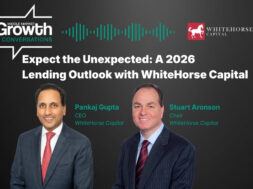How the Middle Market Fared in Midterms
A look at how Tuesday's elections will impact priorities of the House Financial Services Committee, regulatory activity, bipartisan initiatives, and more.

UPDATE: Two races involving members of the Congressional Caucus for Middle Market Growth were too close to call at the time this article was posted. Since then, Kyrsten Sinema was declared the winner of Arizona’s open U.S. Senate seat on Nov. 12, beating Rep. Martha McSally. Tom MacArthur conceded the New Jersey House race to his Democratic challenger Andy Kim on Nov. 14.
As a result of Tuesday’s midterm elections, Republicans maintained their majority in the Senate while the House of Representatives flipped to Democratic control. The shift underscores the need for continued education about the economic contributions of the middle market as the incoming majority in the House looks to push back on tax cuts and a variety of business issues. Meanwhile, it appears unlikely that Congress will pass comprehensive legislation, although there may be an outside push for bipartisanship on issues such as infrastructure.
Members of the Congressional Caucus for Middle Market Growth had a good night. At press time, all of the caucus members up for re-election held their seats, although two co-chairs of the caucus are involved in races that are still too close to call: Rep. Tom MacArthur of New Jersey, and Rep. Kyrsten Sinema, who is running for U.S. Senate in Arizona.
Middle-market deal-makers should expect the Trump administration’s deregulatory agenda to continue through executive agencies and the courts, though the administration will likely face increased scrutiny from the House by way of hearings, subpoenas and investigations. The executive branch is largely responsible for foreign trade policy, although trade deals must pass through the legislature and thus are increasingly unlikely with a Democratic majority in the House.
House Outlook
ACG expects a variety of political messaging bills to come out of the House of Representatives and subsequently die in the Senate, though not without significant amounts of publicity. Democrats will likely take the opportunity to raise a variety of hot-button issues, such as President Trump’s taxes. Legislative gridlock will increase significantly, leading to a greater possibility of spending standoffs and government shutdown as a result.
Democratic leadership has strongly pushed back against initiating presidential impeachment proceedings. But now that the party controls the House, the possibility remains—although the Republican-controlled Senate would likely shut down any such proceedings. In any case, expect a variety of investigations and subpoenas.
There’s a significant opportunity to educate the incoming congressional class on the importance of the middle market, and ACG plans to engage and educate these new members. Outside of partisan issues, there is strong reason to believe that the House will focus on issues related to automation, manufacturing and the future of work, all of which have an outsized impact on middle-market companies.
“There’s a significant opportunity to educate the incoming congressional class on the importance of the middle market, and ACG plans to engage and educate these new members.”
House Financial Services Committee
Rep. Maxine Waters, D-Calif., is first in line to become chair of the House Financial Services Committee. Under her leadership, there will likely be highly publicized hearings on issues of concern for progressives. Consumer protection and housing reform will likely take center stage. Concerns about private capital are not necessarily at the top of the list, but there is a greater chance for negative political messaging surrounding the private capital model. It is critical for ACG to be engaged and involved in opposing efforts to unfairly characterize private capital.
Waters has said she will do to banks what they did to the “average American” during the 2008 financial crisis. According to reporting from American Banker, she addressed financial institutions while speaking before a group of constituents: “What I’m going to do to you is fair. I’m going to do to you what you did to us.”
Senate Outlook
We expect the Senate to shut down any partisan bills coming out of the House. And even though Republicans have held on to control of the chamber, they will not have the 60 votes required to invoke cloture. This means that Senate Republicans will still need several Democrats to move legislation. Still, with control over judicial nominations and agency confirmations, Republicans will continue to enact President Trump’s agenda everywhere but the legislature.
While gridlock is to be expected, we may begin to see significant changes in tone and areas of debate. This requires extensive engagement and education to ensure the middle market is fairly represented.
Senate Committee on Banking, Housing, and Urban Affairs
In the past year, the first major changes to the Dodd-Frank Act were passed, having been championed by the Senate Banking Committee and passed by the Senate on a bipartisan basis. This is likely to be the only change to the Dodd-Frank Act—and financial regulation generally—that will be passed for the next two years. With the House firmly under Democratic control, any legislation championed by the Senate and interpreted as a regulatory rollback is unlikely to pass. Likewise, any legislation passed by the House that strengthens financial regulation will be killed quickly in the Senate.
Regulatory Outlook
Though Congress is likely to come to a standstill, the Trump administration’s regulatory agenda will generally continue unabated. Federal agencies, such as the Securities and Exchange Commission, will likely continue to focus on the priorities set in the past two years. While the House flip could lead to a more aggressive tone in Securities and Exchange Commission oversight hearings and more scrutiny over the agency’s activity, SEC Chairman Jay Clayton’s agenda will largely be able to proceed.
The current regulatory environment provides an important opportunity for ACG to advocate for rules and guidance that benefit ACG members and help drive middle-market growth. ACG’s public policy team has been actively engaged with regulators to increase regulatory clarity and advocate for properly tailored regulations, and it will continue to do so in the lame duck period and beyond.

Maria Wolvin is ACG Global’s vice president and senior counsel, public policy.

Ben Marsico is ACG Global’s manager of legislative and regulatory affairs.


